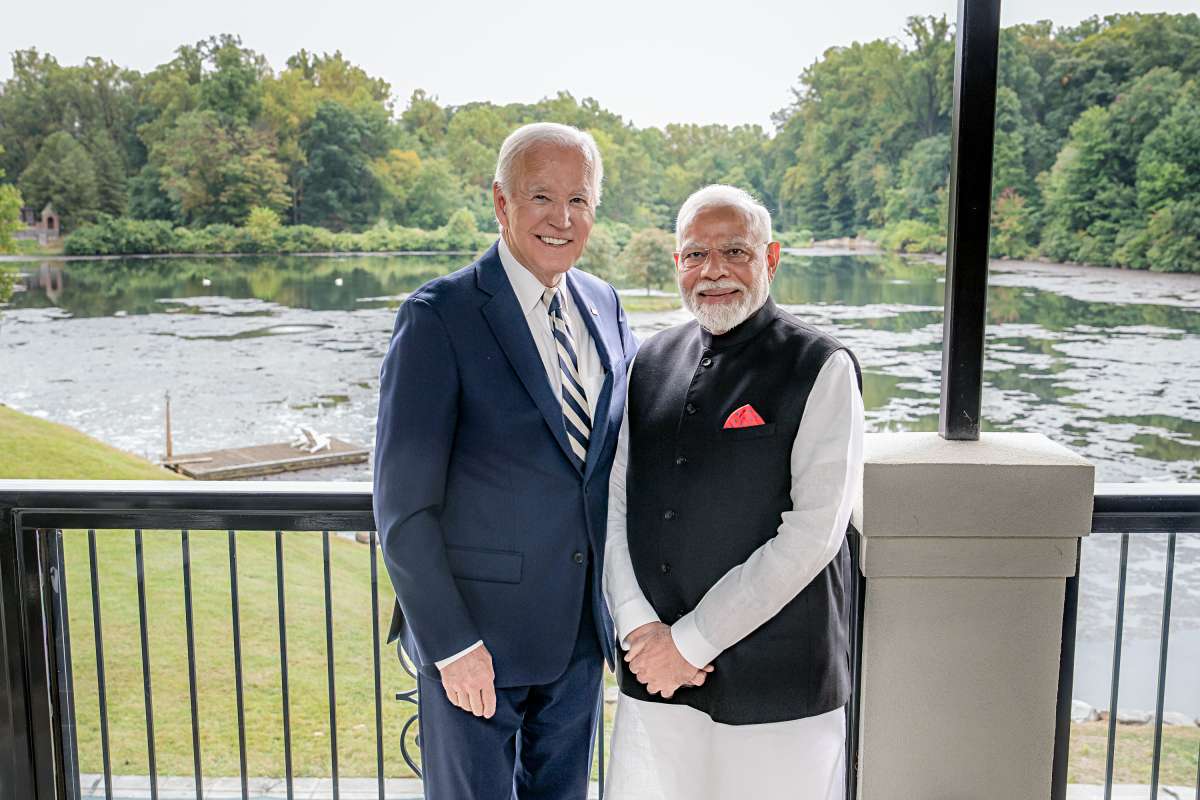Modi, Biden agree to set up a plant in India that will make infrared, gallium nitride and silicon-carbide semiconductors…reports Asian Lite News
India and US have reached an agreement to work together on setting up a semiconductor fabrication plant in India , giving a boost to Prime Minister Narendra Modi’s efforts to bolster manufacturing in the country.
The proposed plant will make infrared, gallium nitride and silicon-carbide semiconductors, according to a White House readout that followed a meeting between US President Joe Biden and Modi in Delaware.
The setting up of the facility will be enabled by support from the India Semiconductor Mission as well as a “strategic technology partnership between Bharat Semi, 3rdiTech Inc, and the US Space Force,” according to the readout.
India’s strategic geopolitical position in Asia has provided a fresh spotlight on the country and the opportunities it can afford in the field of technology. In the last decade, Modi has repeatedly stated that he would position India as an alternative to China, and it has already begun to pull away some of its manufacturing from Apple Inc and Samsung Electronics Co.
Earlier this month, India’s technology minister Ashwini Vaishnaw said that India is attempting to develop the entire chip value chain. India aims to increase its electronics sector to $500 billion by the end of the decade.
The two countries also announced efforts to fund projects “catalysing India’s domestic clean energy supply chain build out” for about $1 billion through the International Bank for Reconstruction and Development.
Modi is visiting the US for the annual Quad summit and in the three-day trip, he is holding bilateral meetings with its leaders, addressing the United Nations General Assembly and meeting with the Indian diaspora and American technology industry executives.
Modi met with Sundar Pichai of Alphabet Inc.’s Google, Jensen Huang of Nvidia Corp. and David Ricks of Eli Lilly & Co.’s among others, and also addressed an Indian diaspora event in Long Island, New York. The next Quad meeting is scheduled to be held in India in 2025.
Didi thanks Modi
Meanwhile, West Bengal Chief Minister Mamata Banerjee thanked Modi and Biden for the proposed joint-collaboration semiconductor manufacturing unit in Kolkata which was finalised during the PM’s tour to US.
According to Chief Minister Mamata Banerjee, the proposal was a result of relentless promotion by the West Bengal government.
According to Banerjee, since early last year, the state information technology department and the state-undertaking Webel (West Bengal Electronics Industry Development Corporation) approached leading semiconductor industries as many chip-designing and packaging start-up companies had relocated to the various information technology parks of Webel after the COVID pandemic.
“Global Foundries, Synopsis, Micron and a few other leading international semiconductor companies held a number of technology-symposiums in West Bengal. They visited our units and offices to discuss emerging technologies and investment potential,” the Chief Minister informed.
Semiconductors on Quad agenda
Quad member countries’ ministers of commerce and industry are set to meet for the first time in the months ahead, and on the agenda will be critical topics such as semiconductor supply chains and emerging technologies.
“There was a memorandum of cooperation between Quad countries for the semiconductor supply chain contingency network. We also expect semiconductors and critical and emerging technology issues at large, to be a topic of discussion when quad Commerce and Industry ministers meet for the first time in the coming months,” National Security Council Director for Indo-Pacific Affairs Josh Rubin said.
The upcoming meeting of the Quad commerce and industry ministries, said Josh Rubin, is poised to address ongoing challenges in the semiconductor industry, which have significantly impacted global supply chains.
This first ministerial gathering is anticipated to lay the groundwork for ongoing cooperation, underscoring the Quad’s role in shaping a resilient future for the Indo-Pacific.
The Quad nations aim to enhance their collaboration to mitigate risks associated with semiconductor shortages that affect various sectors, including technology and automotive industries.
The discussions will build on the recent outcomes from the Wilmington Summit, where leaders celebrated the finalisation of the Semiconductor Supply Chains Contingency Network. This memorandum is designed to facilitate cooperation among Quad countries in addressing vulnerabilities in semiconductor supply chains, ensuring a more resilient framework for future needs.
The Wilmingon Declration joint statemtn said that the Quad welcomes private sector initiatives–including the Quad Investors Network (QUIN), which facilitates investments in strategic technologies, including clean energy, semiconductors, critical minerals, and quantum.
The QUIN is mobilizing a number of investments to promote supply chain resilience, advance joint research and development, commercialize new technologies, and invest in our future workforce, the statement from the leaders of Australia, India, Japan, and the United States read.
Through these strategic discussions, the Quad nations reaffirm their dedication to a free and open Indo-Pacific that benefits all stakeholders involved.
ALSO READ: G7 highlights AI’s impact on cultural sector

Leave a Reply